Over 300 scientists, government officials, and WHO officials from 20 countries assembled in Beijing for “the International Workshop on Multi-Drug Resistant Tuberculosis (TB)” from January 14 to 18, 2013.
The first 2 day-meeting is with NIAID/NIH, entitled “China-U.S. NIAID TB Drug Discovery Forum: Exploring Opportunities for Research Collaboration,” while the second part of the workshop (3 days), is with the Institute of Medicine (IOM), entitled “The Global Crisis of Drug-Resistant Tuberculosis and the Leadership of the BRICS Countries: Challenges and Opportunities.”
Scientists shared the latest state-of-the-art scientific information on drug discovery research to combat multi-drug resistant tuberculosis. In addition, tuberculosis drug development needs and the opportunities for biomedical research to contribute to meeting these needs were also highlighted.
It also stressed urgent themes relating to the problem of MDRTB, extensively drug resistant TB and emergent TB strains that are potentially untreatable with drugs currently available.
The IOM-Institute of Microbiology, Chinese Academy of Sciences (IMCAS) workshop facilitated high-level communication among the world’s top researchers and policy makers in the field of tuberculosis action and research. It is the last in a series of workshops held in the United States, South Africa, Russia, and India, focusing on a number of urgent themes relating to the problem of drug-resistant tuberculosis.
Tuberculosis is an ancient disease which can be dated back to 600 B.C. and to Egyptian mummies. Although there are many drugs used in clinical treatment, such as streptomycin, isoniazid, pyrazinamide, cycloserine, kanamycin, ethambutol, rifampicin, and others, researchers haven’t invented new drugs against tuberculosis for 40 years after the introduction of rifampicin.
Dr. ZHANG Yaping, CAS vice president, addressed the importance of facing the challenge to fight against the drug resistant pathogen. However, tuberculosis has been overlooked in recent years. Western policy-makers frequently talked about the eradication of the disease because tuberculosis cases had dropped to such low rates in the early 1980s.
But as data from the WHO indicate, roughly one-third of the world's population has been infected with Mtb, and new infections occur at a rate of one per second across the globe. More seriously, in 2010, there were 8.8 million new cases of TB diagnosed, and 1.45 million deaths. Of these 1.45 million deaths, about 0.35 million occur in those co-infected with HIV.
Participants felt the sense of urgency and immediately started joining the efforts to fight on MDR TB. The MDR TB 2013 workshop has provided an opportunity to exchange ideas, issues, results and perspectives, present promising new research, and also to identify specific gaps in knowledge calling for more research, funding, and international attention.
The year of 2013 is also the 25th anniversary of the 1st multidrug-resistant TB (MDRTB) outbreak in New York. TB is ranked as the 1st infectious disease in China in terms of mortality and morbidity. Resistance to TB drugs is a growing concern especially in South Africa, China, and Eastern Europe where the pandemic is spreading faster than the National TB programs can manage.
Other distinguished guests include: Elizabeth F Yuan, HHS Health Attaché at the U.S. Embassy Beijing; CHANG Qing, Director, Bureau of International Cooperation, National Natural Science Foundation of China; Dr. CAO Jinghua, Deputy Director of Bureau of International Cooperation, Chinese Academy of Sciences (CAS); DONG Xiuzhu, Deputy Director of The Institute of Microbiology, CAS; Prof. Barbara Laughon, Chair of the NIAID Program Committee; Academician Prof. Gail Cassell, Chair, IOM Planning Committee, Harvard Medical School; Academician Prof. Paul Farmer, Chair, Department of Global Health and Social Medicine, Harvard Medical School; Prof. George Fu Gao, vice director, Beijing Institute of Life Sciences, CAS and vice director-in-general, China CDC; Dr. ZHAO Yanlin, vice director, National Center for TB Control and Prevention, and director of the National Tuberculosis Reference Laboratory, China CDC.
This workshop was hosted by the Institute of Microbiology, Shandong University and the Chinese Center for Disease Control and Prevention, and organized by IMCAS, the Institute of Medicine of the National Academies of America (IOM), National Institute of Allergy and Infectious Diseases (NIAID).

--The workshop "China-U.S. NIAID TB Drug Discovery Forum: Exploring Opportunities for Research Collaboration"
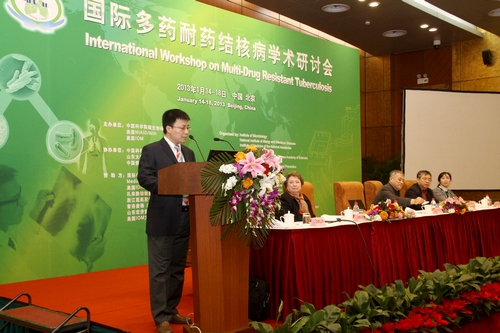
--Prof.ZHANG Lixin from IMCAS chaired the workshop--
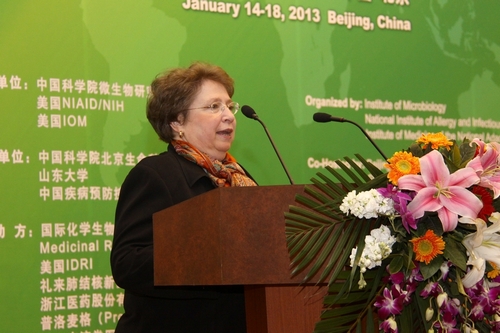
--Prof. Barbara Laughon, Chair of the NIAID Program Committee--
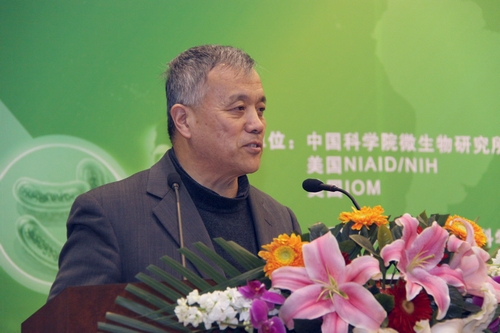
--CHANG Qing, Director, Bureau of International Cooperation, National Natural Science Foundation of China--
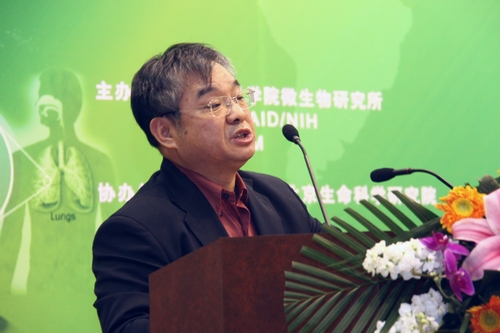
--CAO Jinghua, Deputy Director of Bureau of International Cooperation, Chinese Academy of Sciences (CAS)--
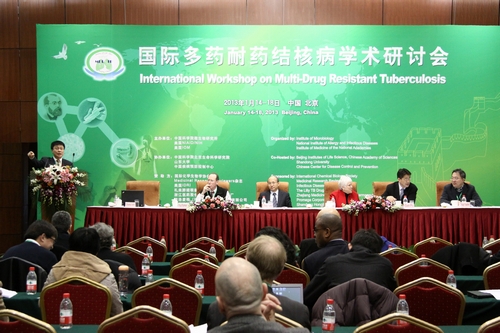
--The workshop "The Global Crisis of Drug-Resistant Tuberculosis and the Leadership of the BRICS Countries: Challenges and Opportunities"--
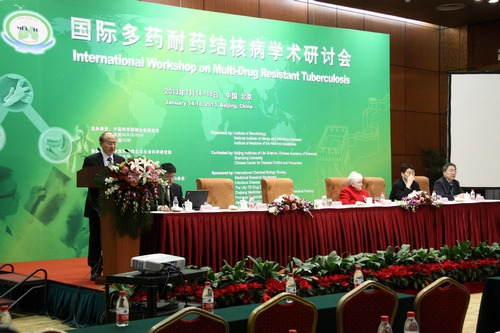
--Dr. ZHANG Yaping, CAS Vice President delivered a speech--
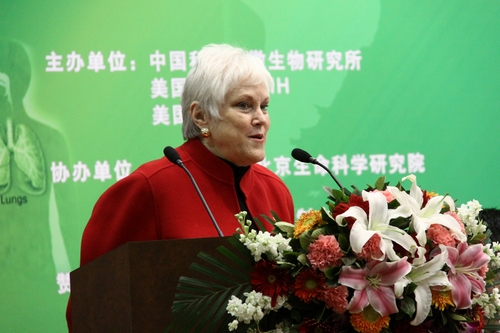
--Academician Prof. Gail Cassell, Chair, IOM Planning Committee, Harvard Medical School--
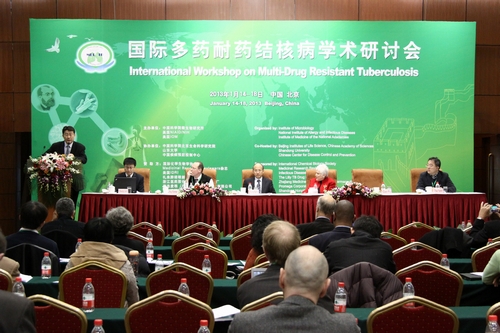
--Prof. George Fu Gao, vice director, Beijing Institute of Life Sciences, CAS and vice director-in-general, China CDC--

--On the workshop--
